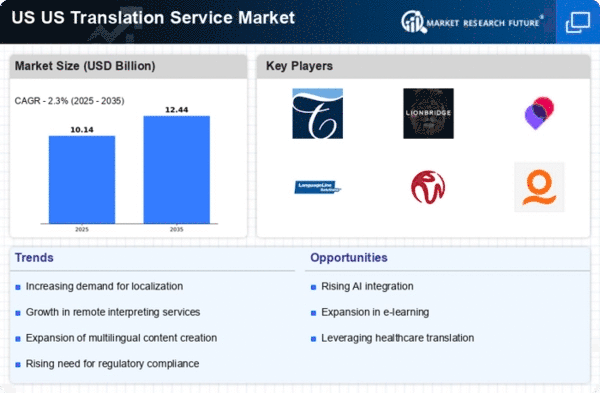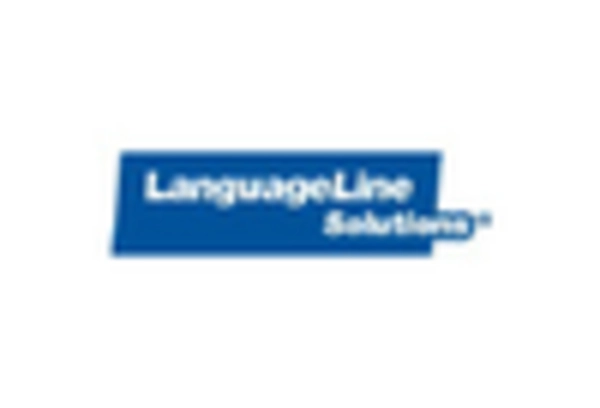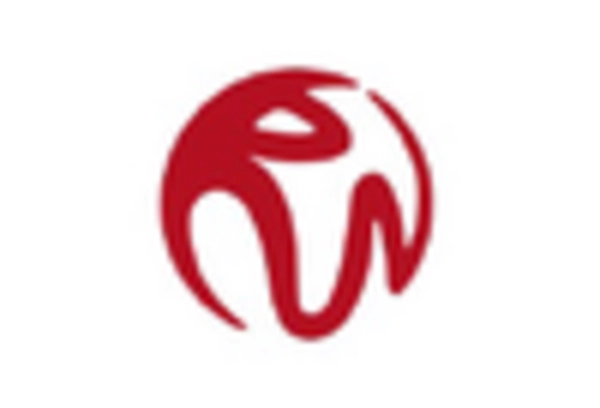Diverse Cultural Demographics
The demographic landscape of the United States is becoming increasingly diverse, which is a significant driver for the US Translation Service Market. As of 2025, approximately 21% of the US population speaks a language other than English at home, underscoring the necessity for translation services in various sectors, including healthcare, education, and legal services. This demographic shift compels organizations to provide materials in multiple languages to effectively communicate with their audiences. For instance, healthcare providers are required to offer translation services to ensure that non-English speaking patients receive adequate care and information. This growing need for culturally competent communication is likely to propel the demand for translation services, as businesses and institutions strive to meet the needs of a linguistically diverse population.
Rising Globalization and Trade
The US Translation Service Market is experiencing a notable surge due to the increasing globalization of businesses. As companies expand their operations internationally, the need for accurate and culturally relevant translations becomes paramount. In 2025, the US export of goods and services reached approximately 2.5 trillion USD, highlighting the importance of effective communication across borders. This trend necessitates the hiring of professional translation services to ensure that marketing materials, legal documents, and product information are appropriately localized. Furthermore, the demand for multilingual support in customer service is also on the rise, as businesses aim to cater to diverse clientele. This growing emphasis on The Translation Service Industry further, as organizations seek to enhance their competitive edge in foreign markets.
Expansion of E-Learning and Online Content
The rapid expansion of e-learning platforms and online content is driving growth in the US Translation Service Market. As educational institutions and businesses increasingly adopt digital learning solutions, the need for translated educational materials, courses, and resources becomes essential. In 2025, the e-learning market in the US is projected to reach 375 billion USD, indicating a substantial opportunity for translation services to cater to this sector. Furthermore, as companies create multilingual content to engage global audiences, the demand for professional translation services to ensure clarity and effectiveness is likely to rise. This trend underscores the importance of translation services in facilitating access to knowledge and resources across linguistic barriers, thereby enhancing the overall learning experience for diverse populations.
Technological Advancements in Translation Tools
The integration of advanced technology in the US Translation Service Market is transforming the landscape of translation services. Innovations such as artificial intelligence and machine learning are enhancing the efficiency and accuracy of translation processes. In 2025, the market for translation software is projected to reach 1.2 billion USD, indicating a robust growth trajectory. These tools not only streamline workflows but also facilitate real-time translation, which is particularly beneficial for industries such as e-commerce and customer support. As businesses increasingly adopt these technologies, the demand for human translators who can provide nuanced and contextually appropriate translations remains essential. This interplay between technology and human expertise is likely to shape the future of the US Translation Service Market, creating opportunities for both tech-driven solutions and traditional translation services.
Increased Focus on Compliance and Legal Standards
The US Translation Service Market is significantly influenced by the heightened focus on compliance and legal standards across various sectors. Organizations are increasingly required to adhere to regulations that mandate the provision of translated materials, particularly in industries such as finance, healthcare, and legal services. For example, the Affordable Care Act emphasizes the need for healthcare providers to offer language assistance services to ensure equitable access to care. As regulatory frameworks evolve, the demand for professional translation services that can accurately convey legal and compliance-related information is likely to grow. This trend not only highlights the importance of precise translations but also positions the US Translation Service Market as a critical component in helping organizations navigate complex legal landscapes.
















